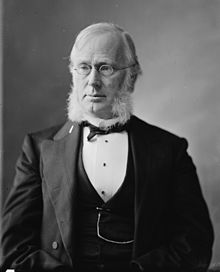George Frisbie Hoar
| George Frisbie Hoar | |
|---|---|
 |
|
|
United States Senator from Massachusetts |
|
|
In office March 4, 1877 – September 30, 1904 |
|
| Preceded by | George S. Boutwell |
| Succeeded by | Winthrop M. Crane |
| Member of the U.S. House of Representatives from Massachusetts's 9th district |
|
|
In office March 4, 1873 – March 3, 1877 |
|
| Preceded by | Alvah Crocker |
| Succeeded by | William W. Rice |
| Member of the U.S. House of Representatives from Massachusetts's 8th district |
|
|
In office March 4, 1869 – March 3, 1873 |
|
| Preceded by | John Denison Baldwin |
| Succeeded by | John M. S. Williams |
| Member of the Massachusetts Senate | |
|
In office 1857 |
|
| Member of the Massachusetts House of Representatives | |
|
In office 1852 |
|
| Personal details | |
| Born |
August 29, 1826 Concord, Massachusetts, U.S. |
| Died | September 30, 1904 (aged 78) Worcester, Massachusetts, U.S. |
| Nationality | American |
| Political party | Republican |
| Alma mater | Harvard University |
| Profession | Law |
| Signature | |
George Frisbie Hoar (August 29, 1826 – September 30, 1904) was a prominent American politician and United States Senator from Massachusetts. Hoar was born in Concord, Massachusetts. He was a member of an extended family that was politically prominent in 18th and 19th century New England.
Hoar graduated from Harvard University in 1846, then studied at Harvard Law School and settled in Worcester, Massachusetts where he practiced law before entering politics. Initially a member of the Free Soil Party, he joined the Republican Party shortly after its founding, and was elected to the Massachusetts House of Representatives (1852), and the Massachusetts Senate (1857).
In 1865, Hoar was one of the founders of the Worcester County Free Institute of Industrial Science, now the Worcester Polytechnic Institute. He represented Massachusetts as a member of the U.S. House of Representatives from 1869 through 1877, then served in the U.S. Senate until his death. He was a Republican, who generally avoided party partisanship and did not hesitate to criticize other members of his party whose actions or policies he believed were in error.
Hoar was long noted as a fighter against political corruption, and campaigned for the rights of African Americans and Native Americans. He argued in the Senate in favor of Women's suffrage as early as 1886. He opposed the Chinese Exclusion Act of 1882, describing it as "nothing less than the legalization of racial discrimination." However, he also believed that Portuguese and Italian immigrants were unfit for U.S. citizenship. As a member of the Congressional Electoral Commission, he was involved with settling the highly disputed U.S. presidential election, 1876. He authored the Presidential Succession Act of 1886, and in 1888 he was chairman of the 1888 Republican National Convention.
...
Wikipedia
